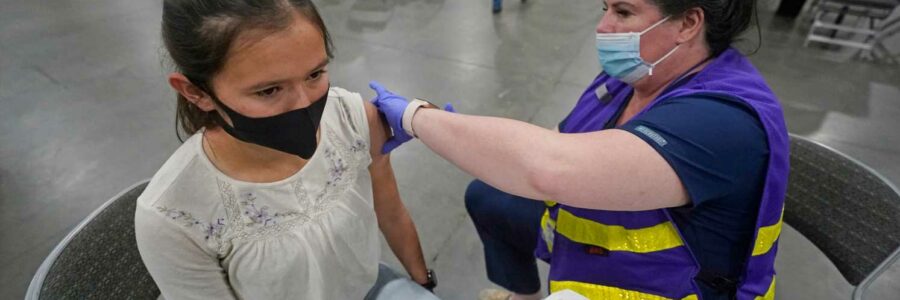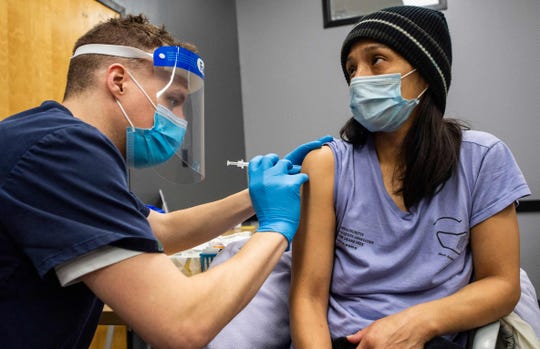
Pfizer-BioNTech study shows COVID-19 vaccine continues to be more than 90% effective for at least 6 months
Six months after getting a second dose of the Pfizer-BioNTech vaccine as part of a 46,000-person clinical trial, volunteers remained more than 90% protected against symptomatic COVID-19 and even better protected against severe disease, a new company study found.
Out of 927 trial participants who fell ill with COVID-19 more than a week after their second dose, only 77 had received the active vaccine, compared with 850 who got a placebo.
There were no serious safety concerns seen among the 12,000 volunteers who are least least six months past their second dose, according to the newly released findings. Many, however, did have typical, short-term side effects like fatigue and sore arms.
The new data is likely sufficient for the vaccine to meet the criteria set by the U.S. Food and Drug Administration for full approval.
All three COVID-19 vaccines authorized so far – from Pfizer-BioNTech, Moderna and Johnson & Johnson – are being distributed under Emergency Use Authorizations rather than full FDA Biologics Licenses, because they did not have long-term safety and effectiveness data.
The FDA allowed the companies to present only two months of data so they could get the COVID-19 shots to the public faster during a global emergency. The agency has said it would consider issuing a full license once a vaccine has a track record of at least six months – the same requirement as for vaccines that prevent other infectious diseases.
Isaac Hoffman holds son Leo while receiving his Pfizer vaccine Thursday in Spanish Fork, Utah. (Photo: Rick Bowmer/AP)
Pfizer and its German collaborator BioNTech, whose vaccine has been administered to nearly 77 million Americans, are expected to submit their application for full licensure to the FDA some time this month.
“These data confirm the favorable efficacy and safety profile of our vaccine and position us to submit a Biologics License Application to the U.S. FDA,” Pfizer CEO Albert Bourla said in a prepared statement.
Others said the data suggests the vaccine deserves full approval. “It seems pretty safe” to assume that the agency will fully license the vaccine, said Luciana Borio, a biotech executive and former FDA chief scientist.
“It’s really wonderful news that these vaccines continue to progress very rapidly toward licensure,” she said.
Full licensure, she said, would be “one less reason for the skeptics to decline vaccination.”
But the general public will notice very little difference, said Jacob Sherkow, a law professor at the University of Illinois College of Law.
The main advantage of licensure, he said, is to provide security to the company that its authorization won’t expire. A Biologics License usually provides a company 12 years of exclusivity for its product.
Emergency Use Authorizations, by contrast, are temporary, Sherkow said. “If the FDA grants an EUA, it can yank it any time it wants for any reason or no reason.” It would also expire when the “emergency” is over.
Edith Arangoitia is vaccinated with the Pfizer-BioNTech Covid-19 vaccine at La Colaborativa in Chelsea, Massachusetts on Feb. 16. (Photo: JOSEPH PREZIOSO, AFP via Getty Images)
“I think (licensure) will give the company some solace that they’re not going to be victims of their own success,” he said. “If you have a very effective vaccine and the vaccine ends the pandemic, then you’ve ended the emergency that authorized the EUA and you’re not authorized anymore. The BLA guarantees that you get to stay on the market indefinitely.”
The FDA will likely move quickly to consider full licensure, Borio said, but noted that staffers are busy with other requests, too.
Pfizer and BioNTech said Wednesday they would ask the FDA for permission to provide their vaccine to adolescents ages 12-15. The vaccine is already authorized for use in older adolescents, and new data suggests it’s just as safe and totally protective in younger ones.
The agency is also expected to be asked within the next few days to review an application for authorization from AstraZeneca and Oxford University for the vaccine they’ve co-developed.
In their latest study Pfizer and BioNTech also showed that their vaccine is effective against a virus variant called B.1.351, first identified in South Africa.
About 800 of the trial participants were from South Africa and nine of them developed COVID-19, all in the placebo group. The companies sequenced the genes of all nine of those infected and found that six belonged to the B.1.351 variant.
“These data also provide the first clinical results that a vaccine can effectively protect against currently circulating variants, a critical factor to reach herd immunity and end this pandemic for the global population,” Ugur Sahin, CEO and co-founder of BioNTech, said in a prepared statement.
The vaccine also appeared to be extremely effective against nearly all cases of severe disease across all trial participants.
The FDA and Centers for Disease Control and Prevention have slightly different definitions for “severe disease.” Under the FDA’s definition, there were 21 cases of severe disease, 20 of whom received a placebo. Under CDC’s definition, 32 trial participants developed severe disease, all of them in the placebo group, according to the study.
Pfizer and BioNTech plan to submit the new data to a peer-reviewed journal for review and publication.
They will continue to follow trial participants for two years to ensure continued safety and effectiveness and to begin to answer one of the last major outstanding questions about COVID-19 vaccines: how long they will remain effective.
Contact Karen Weintraub at [email protected].
Health and patient safety coverage at USA TODAY is made possible in part by a grant from the Masimo Foundation for Ethics, Innovation and Competition in Healthcare. The Masimo Foundation does not provide editorial input.
Allison Oler, 17, receives her Pfizer vaccination, Wednesday, March 24, 2021, in Sandy, Utah. All adults in Utah aged 16 and older became eligible to receive COVID-19 vaccinations Wednesday. (AP Photo/Rick Bowmer) (Photo: Rick Bowmer, AP)
Source: Read Full Article


